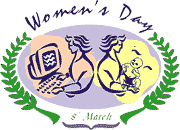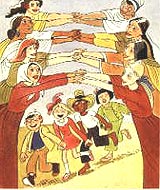口语Festival素材:International Womens Day(国际妇女节)
文章作者 无名 发表时间 2004:12:06 06:09:05
来源 100Test.Com百考试题网
| International Womens Day |
| March 8 |
 International Womens Day is an occasion marked by womens groups around the world. This date is also commemorated at the United Nations and is designated in many countries as a national holiday. When women on all continents, often divided by national boundaries and by ethnic, linguistic, cultural, economic and political differences, come together to celebrate their Day, they can look back to a tradition that represents at least nine decades of struggle for equality, justice, peace and development. International Womens Day is an occasion marked by womens groups around the world. This date is also commemorated at the United Nations and is designated in many countries as a national holiday. When women on all continents, often divided by national boundaries and by ethnic, linguistic, cultural, economic and political differences, come together to celebrate their Day, they can look back to a tradition that represents at least nine decades of struggle for equality, justice, peace and development.
International Womens Day is the story of ordinary women as makers of history; it is rooted in the centuries-old struggle of women to participate in society on an equal footing with men. In ancient Greece, Lysistrata initiated a sexual strike against men in order to end war; during the French Revolution, Parisian women calling for "liberty, equality, fraternity" marched on Versailles to demand womens suffrage. The idea of an International Womens Day first arose at the turn of the century, which in the industrialized world was a period of expansion and turbulence, booming population growth and radical ideologies. In the years before 1910, from the turn of the 20th century, women in industrially developing countries were entering paid work in some numbers. Their jobs were sex segregated, mainly in textiles, manufacturing and domestic services where conditions were wretched and wages worse than depressed. Trade unions were developing and industrial disputes broke out, including among sections of non-unionised women workers. In Europe, the flames of revolution were being kindled. Many of the changes taking place in womens lives pushed against the political restrictions surrounding them. Throughout Europe, Britain, America and, to a lesser extent, Australia, women from all social strata began to campaign for the right to vote. In the United States in 1903, women trade unionists and liberal professional women who were also campaigning for womens voting rights set up the Womens Trade Union League to help organise women in paid work around their political and economic welfare. These were dismal and bitter years for many women with terrible working conditions and home lives riven by poverty and often violence.
In 1910 Womens Day was taken up by socialists and feminists throughout the country. Later that year delegates went to the second International Conference of Socialist Women in Copenhagen with the intention of proposing that Womens Day become an international event. The notion of international solidarity between the exploited workers of the world had long been established as a socialist principle, though largely an unrealised one. The idea of women organising politically as women was much more controversial within the socialist movement. At that time, however, the German Socialist Party had a strong influence on the international socialist movement and that party had many advocates for the rights of women, , including leaders such as Clara Zetkin. Inspired by the actions of US women workers and their socialist sisters, Clara Zetkin ;had already framed a proposal to put to the conference of socialist women that women throughout the world should focus on a particular day each year to press for their demands. The conference of over 100 women from 17 countries, representing unions, socialist parties, working womens clubs, and including the first three women elected to the Finnish parliament, greeted Zetkins suggestion with unanimous approval and International Womens Day was the result. That conference also reasserted the importance of womens right to vote, dissociated itself from voting systems based on property rights and called for universal suffrage - the right to vote for all adult women and men The voice of dissent on this decision came from the English group led by Mrs. Despard of the Womens Freedom League, a group actively engaged in the suffragette movement. Conference also called for maternity benefits which, despite an intervention by Alexandra Kollontai on behalf of unmarried mothers, were to be for married women only. It also decided to oppose night work as being detrimental to the health of most working women, though Swedish and Danish working women who were present asserted that night work was essential to their livelihood. |
相关文章
口语Festival素材:Labor Day(美国劳动节)
口语Festival素材:Notting Hill Carnival(诺丁山儿童节)
口语Festival素材:World Population Day(世界人口日)
口语Festival素材:Dragon Boat Festival(端午节)
口语Festival素材:International Womens Day(国际妇女节)
口语Festival素材:St. Valentines Day(情人节)
口语Festival素材:Sweetest Day(美国甜蜜日)
口语Festival素材:Hungry Ghost Festival(中元节)
口语Festival素材:The Edinburgh International Festival(爱丁堡国际艺术节)
澳大利亚华人论坛
考好网
日本华人论坛
华人移民留学论坛
英国华人论坛
 In 1908, on the last Sunday in February, socialist women in the United States initiated the first Womens Day when large demonstrations took place calling for the vote and the political and economic rights of women. The following year, 2,000 people attended a Womens Day rally in Manhattan.
In 1908, on the last Sunday in February, socialist women in the United States initiated the first Womens Day when large demonstrations took place calling for the vote and the political and economic rights of women. The following year, 2,000 people attended a Womens Day rally in Manhattan.